-
Use Cases
-
Resources
-
Pricing
Pre-Revolutionary Events
Estates-General convenes
May 5, 1789
% complete
The Estates-General convenes on May 5, 1789. It is a meeting of all three estates of France — the clergy, the nobility, and the commoners — to discuss and resolve the financial crisis in the country.
Image source: Estates General of 1789
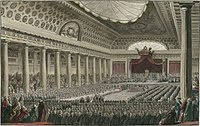
Revolution Begins
Storming of the Bastille
Jul 14, 1789
% complete
The Storming of the Bastille was a turning point in the French Revolution. It occurred on July 14, 1789, when a mob of Parisian revolutionaries attacked the Bastille, a royal fortress and prison. The fall of the Bastille symbolized the triumph of the common people over the monarchy and sparked the beginning of the French Revolution. It is now celebrated as a national holiday in France, known as Bastille Day.
Image source: Storming of the Bastille
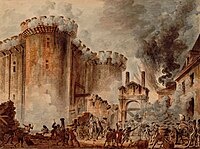
Abolition of Feudalism
Aug 4, 1789
% complete
The Abolition of Feudalism was a crucial event during the French Revolution. It took place on August 4, 1789. On this day, the National Constituent Assembly in France passed a decree that abolished the feudal system and all its associated privileges and obligations. This decree aimed to dismantle the feudal structure of society and establish equality among all citizens. The abolition of feudalism was a significant step towards the modernization and democratization of France.
Image source: Abolition of feudalism in France
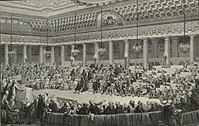
Declaration of the Rights of Man and of the Citizen
Aug 26, 1789
% complete
The Declaration of the Rights of Man and of the Citizen was adopted by the National Constituent Assembly of France on August 26, 1789. It is a fundamental document of the French Revolution that established the rights and freedoms of the French people. The declaration was influenced by Enlightenment ideals and emphasized the principles of liberty, equality, and fraternity. It proclaimed that all men are born free and equal, and that they have natural and inalienable rights, including the right to liberty, property, security, and resistance to oppression. The declaration also laid the foundation for the development of constitutional law in France and influenced the drafting of the Universal Declaration of Human Rights.
Image source: Declaration of the Rights of Man and of the Citizen
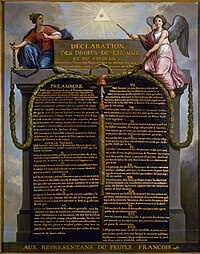
Women's March on Versailles
Oct 5, 1789
% complete
The Women's March on Versailles was a significant event during the French Revolution. It occurred on October 5, 1789, when thousands of women from Paris marched to the Palace of Versailles to demand bread and to protest against the high price of food. The march was sparked by food shortages and economic difficulties faced by the people, especially women. The women were joined by some men, and they forced King Louis XVI and Queen Marie Antoinette to return to Paris with them. This event marked a turning point in the revolution and symbolized the power of the people to challenge and influence the monarchy.
Image source: Women's March on Versailles
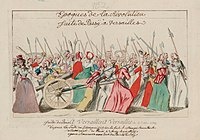
Louis XVI attempts to flee
Jun 20, 1791
% complete
Louis XVI, the king of France, attempted to flee from Paris to escape the French Revolution. On June 20, 1791, he and his family disguised themselves and made their way towards the border. However, they were recognized and apprehended in the town of Varennes, and were brought back to Paris as prisoners. This event further solidified the distrust and resentment towards the monarchy, as it demonstrated the king's lack of commitment to the revolution and his attempts to undermine it.
Image source: Louis XVI
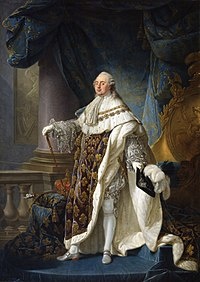
Legislative Assembly established
Oct 1, 1791
% complete
The Legislative Assembly was established on October 1, 1791, and replaced the National Assembly. It was the legislative body of France during the early phase of the French Revolution. The assembly consisted of 745 members, known as deputies, who were elected through indirect elections. The Legislative Assembly had the power to make laws and control the finances of the country. However, it faced many challenges and conflicts, both internally and externally, which eventually led to its dissolution in September 1792.
Image source: Uttar Pradesh Legislative Assembly
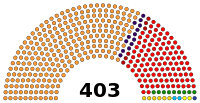
Execution of Louis XVI
Jan 21, 1793
% complete
Execution of Louis XVI, also known as Louis Capet, took place on January 21, 1793. Louis XVI was the last king of France before the fall of the monarchy during the French Revolution. He was arrested in August 1792 and placed on trial. The National Convention found him guilty of conspiracy against the public liberty and unanimously voted for his execution. Louis XVI was executed by guillotine in the Place de la Révolution in Paris.
Image source: Execution of Louis XVI
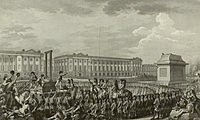
Reign of Terror
Committee of Public Safety established
Apr 6, 1793
% complete
The Committee of Public Safety was established by the National Convention during the French Revolution on April 6, 1793. Its purpose was to exercise executive power and defend the Republic against its enemies, both domestic and foreign. Led by Maximilien Robespierre, the Committee implemented policies and measures aimed at consolidating power, suppressing opposition, and ensuring the survival of the revolution. During its rule, the Committee instituted the Reign of Terror, a period of mass executions and severe repression targeting counter-revolutionaries. The Committee of Public Safety was dissolved on July 27, 1794, following the fall of Robespierre and the end of the Reign of Terror.
Image source: Committee of Public Safety

Reign of Terror begins
Sep 5, 1793
% complete
The Reign of Terror was a period of violence during the French Revolution characterized by mass executions and purges of perceived enemies of the revolution. It began on September 5, 1793, when the Committee of Public Safety took control of the government and implemented drastic measures to suppress counter-revolutionaries. The period lasted until July 28, 1794, when Robespierre, one of the key figures of the Committee, was arrested and executed. During the Reign of Terror, thousands of people were executed by guillotine, including nobles, clergy, and even some revolutionary leaders who were deemed threats to the revolution. The Committee of Public Safety also established revolutionary tribunals to prosecute and condemn individuals suspected of counter-revolutionary activities. The Reign of Terror created a climate of fear and suspicion, with people denouncing each other to save themselves. It is estimated that around 16,000 people were executed during this period.
Image source: Timeline of the French Revolution
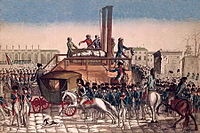
Execution of Marie Antoinette
Oct 16, 1793
% complete
Marie Antoinette, the queen of France, was executed on October 16, 1793, during the French Revolution. She was accused of treason and conspiring with the enemies of the French Republic. Her trial was conducted by the Revolutionary Tribunal, and she was found guilty. Marie Antoinette was then brought to the guillotine in a public execution. Her execution was seen as a symbol of the end of the French monarchy and the power of the people.
Image source: Marie Antoinette
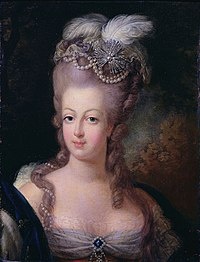
Robespierre's execution
Jul 28, 1794
% complete
Robespierre, along with several of his allies, is arrested and executed by guillotine on July 28, 1794. The execution marks the end of the Reign of Terror and the beginning of the Thermidorian Reaction, a period of relative moderation in the French Revolution.
Image source: Maximilien Robespierre
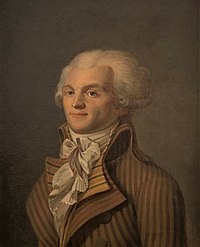
Rise of Napoleon
The Directory established
Nov 2, 1795
% complete
The Directory was a five-member committee that governed France from November 2, 1795, until November 9, 1799. It was established after the fall of the National Convention and the end of the Reign of Terror. The Directory aimed to create a more stable government and restore order in France.
Coup of 18 Brumaire
Nov 9, 1799
% complete
The Coup of 18 Brumaire was a coup d'état staged by Napoleon Bonaparte on 9 November 1799, which overthrew the Directory and established the Consulate, marking the end of the French Revolution.
Image source: Coup of 18 Brumaire
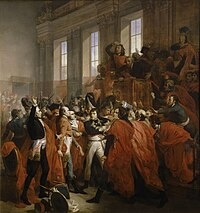
Napoleon becomes First Consul
Dec 24, 1799
% complete
Napoleon becomes First Consul on December 24, 1799. After overthrowing the Directory in a coup d'état, Napoleon Bonaparte established himself as the First Consul of France, effectively making him the ruler of the country. This event marked the end of the French Revolution and the beginning of Napoleon's rise to power.
Battle of Marengo
Jun 14, 1800
% complete
The Battle of Marengo was fought on June 14, 1800, between the French army under Napoleon Bonaparte and the Austrian army in northern Italy. It was one of the most important battles of the French Revolutionary Wars, as it secured Napoleon's position as First Consul of the French Republic and marked a turning point in his military career. The French victory at Marengo led to the signing of the Treaty of Lunéville, which ended the war between France and Austria.
Image source: Battle of Marengo
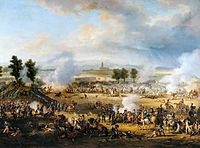
Treaty of Amiens
Mar 27, 1802
% complete
The Treaty of Amiens was signed on March 27, 1802, between the French Republic and the United Kingdom of Great Britain and Ireland. It marked the end of the French Revolutionary Wars and the beginning of a brief period of peace between the two nations.
Image source: Treaty of Amiens
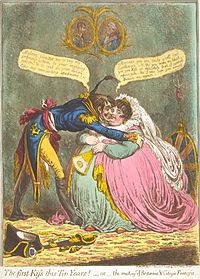
Napoleonic Code enacted
Mar 21, 1804
% complete
The Napoleonic Code was enacted on March 21, 1804. It was a comprehensive set of laws that reformed the French legal system. The code aimed to provide a uniform set of laws for all citizens and eliminate the arbitrary and inconsistent laws that existed before. The code covered civil, criminal, and commercial law and introduced principles such as equality before the law, protection of private property rights, and freedom of contract. It also established a legal framework for the functioning of the French Empire. The Napoleonic Code had a significant impact on legal systems in many other countries, particularly in Europe and Latin America.
Image source: Napoleonic Code
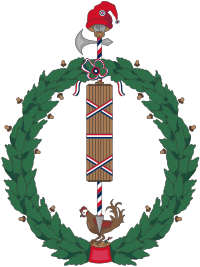
Napoleon crowns himself Emperor
Dec 2, 1804
% complete
Napoleon crowns himself Emperor on December 2, 1804. This event marked the official establishment of Napoleon's rule in France. After successfully consolidating his power as First Consul, Napoleon decided to change the French government to a hereditary monarchy. In a grand ceremony held at the Notre-Dame Cathedral in Paris, Napoleon took the crown from Pope Pius VII and placed it on his own head, symbolizing his divine right to rule. With this coronation, Napoleon hoped to strengthen his position as the leader of France and legitimize his authority in the eyes of the people. However, this move angered many who viewed it as a betrayal of the ideals of the French Revolution, which had sought to overthrow the monarchy. Nevertheless, Napoleon's crowning as Emperor marked a turning point in French history and solidified his status as one of the most powerful leaders of the time.
Image source: Crown of Napoleon
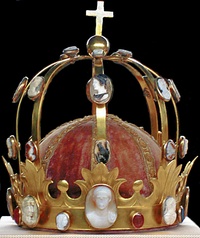
End of the Revolution
End of the French Revolution
Nov 9, 1799
% complete
The End of the French Revolution took place on November 9, 1799. This event marked the end of the radical phase of the revolution and the beginning of a new government known as the Consulate. It was led by Napoleon Bonaparte, who eventually became the Emperor of France. The revolution had brought significant social, political, and economic changes to France, but it also resulted in the loss of thousands of lives and a period of political instability. The Consulate aimed to restore order and consolidate the gains of the revolution while maintaining a strong central government.
Image source: French Revolution
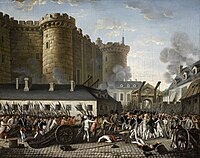
Key Facts
- The French Revolution began with the Storming of the Bastille on July 14, 1789.
- The Declaration of the Rights of Man and of the Citizen was adopted by the National Assembly on August 26, 1789.
- King Louis XVI and Queen Marie Antoinette were executed by guillotine in 1793.
- Maximilien Robespierre and the Committee of Public Safety led the Reign of Terror from 1793 to 1794.
- Napoleon Bonaparte seized power in a coup d'état in 1799, ending the French Revolution.
Source
This French Revolution timeline was generated with the help of AI using information found on the internet.
We strive to make these timelines as accurate as possible, but occasionally inaccurates slip in. If you notice anything amiss, let us know at [email protected] and we'll correct it for future visitors.
Create a timeline like this one for free
Preceden lets you create stunning timelines using AI or manually.
Customize your timeline with one of our low-cost paid plans
Export your timeline, add your own events, edit or remove AI-generated events, and much more
Free
$
0
free forever
No credit card required.
Basic
$
10
/month
billed annually
Cancel anytime.
Pro
$
16
/month
billed annually
Cancel anytime.
Common Questions
Can I cancel anytime?
Yes. You can cancel your subscription from your account page at anytime which will ensure you are not charged again. If you cancel you can still access your subscription for the full time period you paid for.
Will you send an annual renewal reminder?
Yes, we will email you a reminder prior to the annual renewal and will also email you a receipt.
Do you offer refunds?
Yes. You can email us within 15 days of any payment and we will issue you a full refund.
What if I have more questions?
Check out our pricing docs or send us an email anytime: [email protected].